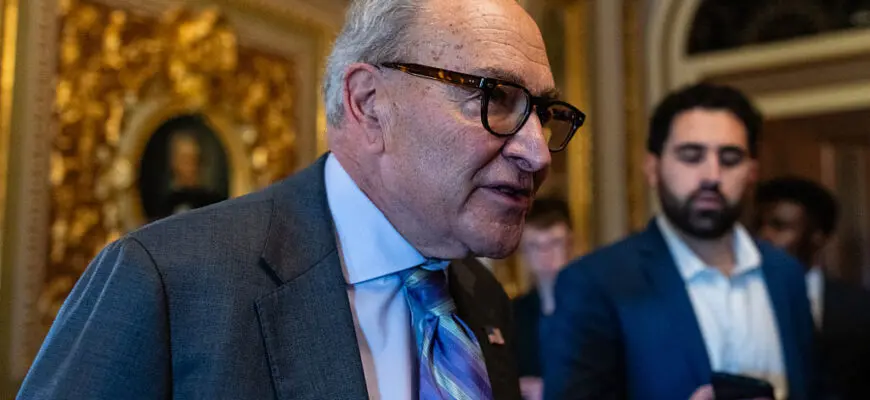The US government shutdown, now the longest in history and entering its sixth week, has intensified internal Democratic divisions, pitting progressives who demand an extension of expiring Affordable Care Act (ACA) subsidies against moderates focused on reopening the government immediately.
A group of progressive Senators is urging colleagues not to accept any deal that reopens the government without a binding commitment to extend the Affordable Care Act’s expiring insurance subsidies. This demand remains the central sticking point of the prolonged shutdown.
“If they cave now and go forward with a meaningless vote, I think it will be a horrible policy decision, and I think politically, to the Democrats,” progressive Sen. Bernie Sanders of Vermont told reporters. “Some of you may have heard the expression, ‘when we fight, we win.’ …Well, when you cave, you lose.”
In contrast, several moderate-leaning Democrats declined to state on Thursday how they would vote on any proposal that fell short of a binding commitment to extend the ACA subsidies. Sen. Ron Wyden, an Oregon Democrat, told TIME, “My red line is those people . I’ll leave it at that.”
Democrats seized on President Donald Trump’s admission that the shutdown had been a “big factor, negative” in recent GOP election losses, arguing that the political pressure requires Republicans to hold discussions. Senate Majority Leader Chuck Schumer said on the Senate floor, “Donald Trump clearly is feeling pressure to bring this shutdown to an end. Well, I have good news for the president: Meet with Democrats, reopen the government.”
Yet the party remains divided over whether the election results amounted to a mandate to continue pressing their health care demands. Sen. John Fetterman of Pennsylvania, a vocal opponent of his party’s shutdown strategy, told TIME, “If you think because we won elections that we’ve expected to do that to keep our government shut down, then that would confirm that it’s a political game.”
Adding to the urgency, the Federal Aviation Administration (FAA) announced plans on Wednesday to reduce air traffic by 10% across 40 major markets starting Friday, citing safety concerns amid severe staffing shortages. The move is a potent symbol of the shutdown’s cascading effects.
The core of the dispute remains unchanged: Senate Democrats are unwilling to reopen the government without a firm commitment to extend key ACA subsidies that expire at the end of the year, while Speaker Mike Johnson and House Republicans refuse to guarantee even a future vote on the matter.
“I’m not promising anybody anything,” Johnson told reporters Thursday morning, flatly rejecting a request from Senate negotiators to assure a House vote on extending the subsidies. Several Senate Democrats signaled that Johnson’s comments were problematic, sending negotiators scrambling for new options even as pressure mounted to bring relief to millions of furloughed federal workers and families missing food assistance payments.
Senate Republicans are planning to hold another vote on the House-passed continuing resolution on Friday, which would reopen the government but has been voted down 14 times by Senate Democrats. Republicans have also proposed a deal to reopen the government through at least January, advance three full-year spending bills, and guarantee a future vote on the expiring health subsidies. That vote, however, would carry no promise of passage or support from the House or White House.
“I don’t see the movement by the president or the speaker or the leader to do that,” Sen. Chris Coons, Democrat of Delaware, told reporters. “If their position remains, we will not speak to you, we’re gonna have a really hard time resolving this.”
President Trump is urging his party to end the crisis by abolishing the Senate filibuster, stating that the chamber’s 60-vote threshold for legislation should be “terminated.” Senate Majority Leader John Thune of South Dakota, the chamber’s top Republican, continues to dismiss the idea. Johnson’s own tone has hardened; he said Thursday, “I’m less optimistic this morning than I was yesterday,” blaming Senate Majority Leader Chuck Schumer for “pulling back” centrist Democrats from negotiating too closely with Republicans.
As the shutdown grinds on, one new element of the talks has drawn attention: a potential rollback of the White House’s mass firings of federal employees. Several Republicans have suggested that restoring those positions—along with granting back pay to furloughed workers—could be part of a broader reopening deal.
Sen. Susan Collins of Maine, the Republican chairwoman of the Appropriations Committee, told reporters, “We’re still negotiating that language.” Collins said she wants fired workers to be “recalled,” adding that it was important to “get the government functioning again in a fair way.” The issue could offer a face-saving compromise, particularly for Senate Republicans seeking to demonstrate responsiveness to federal workers in their home states. Yet progressives remain wary of trading away leverage for a narrow fix without the ACA extensions.
Even if the Senate reaches an agreement, lawmakers warn that it could take several days for any bill to clear both chambers—especially with the House out of session since mid-September. Some Senate Republicans are pressing to adjourn next week for the Veterans Day recess if talks stall, a move that could further inflame public anger as paychecks for federal workers again come due.
Democrats say the message from voters is clear: don’t give in. Sen. Richard Blumenthal, a Connecticut Democrat, told reporters, “We are winning the hearts and minds of the American people. We’ve come this far and the American people seem to be with us.”
But others, like Fetterman, warn that the political risks of continued brinkmanship are growing. He told TIME, “We love to overplay our hands. It’s like we had great results with that election. But that doesn’t mean we’ve changed the dynamic in D.C.” For now, that warning has gone unheeded, and Washington remains locked in a familiar stalemate.









